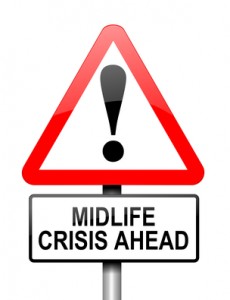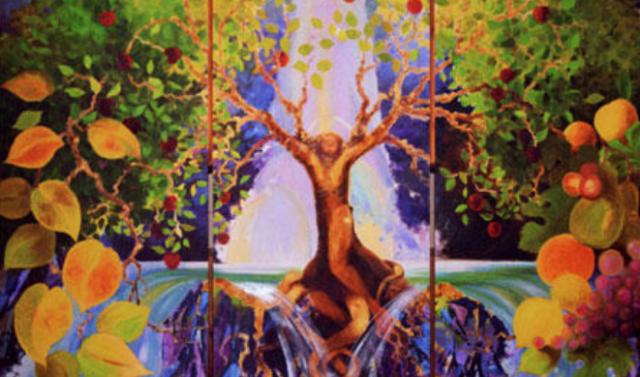In midlife, it’s important to re-focus your energy based on who you truly are—not simply who your family, partner, or society expect you to be.
Midlife: It’s been called “the old age of youth, and the youth of old age.” Like adolescence, midlife can be a difficult stage. The individual embarks on a journey that is physical, emotional, relational, and spiritual in nature.
An internet search brings up many ideas about the age span of “midlife,” ranging from as young as 35 to as old as 65. For women, a big part of the midlife transition involves the physical and emotional changes of menopause. And for both genders, the word “midlife” often appears with  another—as in “midlife crisis.”
another—as in “midlife crisis.”
But midlife is not rigidly defined in terms of some precise age span. It’s also about the unique physical, emotional, spiritual, vocational, and relational changes and challenges of this transition.
Midlife is a time when you may be facing:
- Longing for deeper meaning or purpose
- Physical changes, both minor and major
- Job/vocational dissatisfaction or burnout
- Grief about “lost possibilities” for your life
- A marked increase/decrease in sexual desire
- Acting on compulsions: alcohol, drugs, food, gambling, etc.
- Restlessness or boredom with old responsibilities & routines
- Changing relationships with adolescent children, aging parents, or spouse
- Questioning relationship, career, and other major decisions
- Coming to grips with your own mortality
Midlife changes might also be accompanied by depressed or anxious mood, irritability, increased anger, or sleep problems. These symptoms might be caused by physiological or neurochemical changes–changing hormone levels, for instance. Or, they could be magnified by some of the above stressors.
Midlife challenges have some common characteristics, but everyone’s journey is unique. And discovering the deeper meaning of your own particular experience of midlife is crucial. Embarking on that path of discovery might well be the way to:

- Make courageous changes in relationships or vocation
- Discover–or rekindle–a sense of your life’s purpose
- Develop healthy habits of self-care
- Find a new sense of inner peace
- Cultivate the confidence that you’re on the path that’s meant for you
The first half of life is focused on building one’s public identity, what Carl Jung called the “persona.” The individual receives an education and decides on a vocation. You may get married, have children, become a homeowner, and acquire material possessions. You develop patterns, habits, and particular roles. Often you spend tremendous energy adapting to what family, friends, and/or society need or expect you to be.
The persona is like a “mask”—the public face you show to the world. It’s an important part of psychic development, part of what helps you get along in the world. But the masks you wear in the  first half of life represent only part of who you are.
first half of life represent only part of who you are.
On your midlife journey, you’re called to “go deeper,” to explore other parts of yourself you’ve neglected. You may be called to navigate a path in your internal landscape that you’ve never travelled before. The second half of life is not so much about acquiring knowledge, skills, material possessions, and a social identity. Midlife is more about finding meaning, purpose, balance, and integration. This period brings up questions such as:
- Why am I here on this earth?
- What parts of myself did I ignore or suppress earlier in life?
- Which relationships/activities do I want to give more time to?
- Which ones do I want to change or eliminate?
- How can I deal with the challenges my body experiences as I age?
There are no “universal prescriptions” for undertaking the midlife journey. But there ARE some commonalities that apply to all of us. In midlife, it’s time to re-focus your energy based on who you truly are—not simply who your family, partner, or society expect you to be. You need to attend to the cues your body gives you as you age, so you can live this “second half of life” with vitality. You may need to embrace parts of yourself you don’t like very much, parts you’ve cut off, neglected, or forgotten. These “shadow parts” need to to be acknowledged and made more conscious, not cast off and ignored.
If you’ve been struggling with any of these issues of midlife, perhaps it’s time to talk to someone who can help you sort things through. Give me a call at (253) 761-8808 x2, or email me at joanna@soulcarepsychotherapy.com if you’d like to talk about the possibility of making an appointment. And check back at www.soulcarepsychotherapy.com soon for followup articles on the “midlife journey.”
© 2013 Joanna Robinson, M.Div., M.Ed. All Rights Reserved. No part of this article may be distributed without permission.

Chelsea Wakefield, PhD, LCSW says
Hi Joanna,
I think this is a wonderful essay and would like to post it in my various sites- with proper referencing of course. Do I have your permission to do so. Please take a look at a Jungian oriented program I am offering in Massachusetts in February. I have created an experiential weekend for women to explore the four quadrants outlined by Toni Wolff: Mother, Lover (Hetaira), Mystic (Medial Woman), and Amazon/warrior. It might be something you are interested in or perhaps some of your “mid-life” clients. These workshops are full of mid-life women in re-evaluation. http://rowecenter.org/events.php?event=247
Best wishes,
Chelsea Wakefield
Joanna Robinson, M.Div, M.Ed says
Hello Chelsea,
Thank you for your good
thoughts–and yes, I’d be honored for you to share my article! Your “Luminous Woman” weekend sounds wonderful–a great container for women seeking support on their midlife journeys.
Blessings in your work,
Joanna